映后导演QA —— 当我拍下20年后最糟糕的自己
更新时间:2025-08-26 11:47:08
编者按:MIFF25结束了,但是好像大家都还沉浸在赶场子观影的状态……不能自拔!我像前两周一样,早上打开了网页,想看看有没有我喜欢的电影不用standby了!可是……结束咧!但看到MIFF Awards的获奖是《诗人》,哦,还有个导演的QA环节可以拿出来分享一下!很有意思!如下:
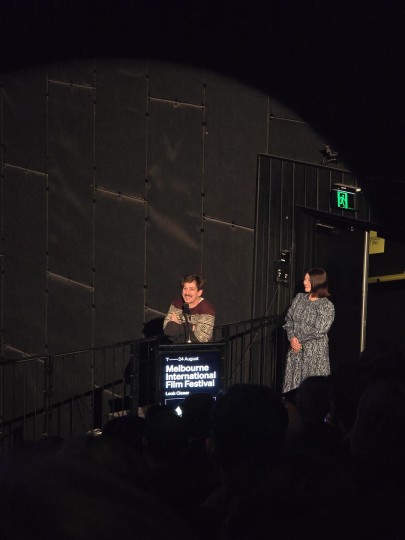
关于创作灵感来源
Interviewer: You mentioned feeling frustrated with cinema, even wanting to quit. Can you talk about that moment? (没录上,我编的) 采访者: 您提到过曾经对电影感到非常沮丧,甚至一度想要放弃。能和我们聊聊当时的处境吗?
Director: Like frustrated of cinema I wanted to quit because making independent cinema in Columbuia is quite hard I guess here exponents environment. But and like I was gonna feel I was getting old and I in my first film I we finish it during the pandemic so we have to put around we could release the film. I was thinking that I my economic stability was not the best like I spent a lot of years making cinema. I was thinking that maybe I should focus on my other job. I'm a professor as well in Columbia. 导演: 是的。当时我对电影非常沮丧,甚至想过放弃。在哥伦比亚拍独立电影真的很难,环境也不算友好。我感觉自己在变老。我的第一部电影正好在疫情期间完成,却只能等待上映的机会。当时经济状况也很不理想,毕竟我花了许多年在电影上。我甚至想,也许该把精力转向另一份工作——毕竟我还是哥伦比亚大学的一名教授。
Interviewer: So in a way, this film was born from imagining the worst version of yourself in 20 years? 采访者: 所以,这部电影可以说是源自您对“20年后最糟糕的自己”的想象吗?
Director: Now I was a professor, and I started thinking what would I become with cinema in 20 years. Probably one of my own professors in Columbia. There are these professors who are like these cops, these old men with views stuck in the past, like old-fashioned dinosaurs. And I was afraid of becoming that. So I said maybe I’ll make a film about the worst person of myself. You started from frustration, but I used it. It’s funny because I was thinking of making a film about me in 20 years, the worst person of myself. When I made it, I kind of reconnected with my younger self, when I was feeling so passionate about cinema again. Because comedy—for the first time I was so radical with comedy that I decided to go all the way. Somehow I reconnected with the passion of cinema through that. 导演: 当时我已经是教授了,就开始思考:如果我继续拍电影,20年后我会变成什么样?也许就会像我自己的那些老师一样,固执地停留在过去——就像“恐龙”一样。我害怕自己变成那样。所以我决定,不如拍一部关于“最糟糕版本的自己”的电影。虽然出发点是沮丧,但我把它转化成了创作。滑稽的是,当我真的去拍摄这部关于“未来最糟糕自己的”电影时,我反而重新与年轻时那个充满激情的自己建立了联系。尤其是喜剧——这是我第一次如此彻底地投入到喜剧中,决定全力以赴。某种程度上,这让我重新找回了对电影的热情。
Interviewer: And did that help you overcome the frustration? 采访者: 这是否帮助您克服了当时的沮丧?
Director: I think I managed to put my frustrations as an exorcism, to sort of feel again the passion, the flame of professional cinema. It was something like that. 导演: 我觉得自己把那份沮丧当成了一种“驱魔”的过程,借此重新感受到专业电影创作的火焰与激情。大概就是这样。
关于角色塑造
Interviewer: You just mentioned that this film was born from the idea of what the worst version of yourself would be in 20 years. One character even describes him as a walking problem, but at the same time he’s quite endearing. As a writer, that balance must be difficult. How did you create him, and how did you find the balance between being incredibly frustrating and also generous? 采访者: 您刚刚提到,这部电影的灵感来自“20年后最糟糕的自己”这个想法。片中甚至有角色形容他是一个“行走的问题”,但同时又让人觉得可爱。作为编剧,这种平衡一定很难把握。您是如何塑造这个角色的?又是如何在“令人沮丧”和“慷慨可亲”之间找到平衡的?
Director: Even though he fails a lot and he’s a problem, I wanted to portray his fragility. When I was writing the script, I was thinking about many things—like all the dilemmas in cinema. In some way, I felt like a critic, because I also see many issues with cinema, like making a film in Colombia, which I tried to portray. But I also have a lot of issues as a man nowadays. I’m at an age where I realize I’m no longer young, but I still feel connected with the younger generation. I carry prejudices from the past, yet I’m also searching for hope. So I put those dilemmas into him. It was very hard to finance the film, because honestly, nobody really cares about these kinds of stories. 导演: 虽然他不断失败、问题重重,但我还是想表现他的脆弱。在写剧本的时候,我思考了很多事情——比如电影中的困境。在某种程度上,我就像一个批评者,因为我也看到电影本身的许多问题,比如在哥伦比亚拍片时所面临的挑战,这些我都试着写进去了。同时,作为一个男性,我也面对许多问题。我正处在一个意识到自己已不再年轻的年纪,但又仍然能与年轻一代产生联系。我背负着来自过去的偏见,却也在寻找希望。所以我把这些矛盾放进了角色里。融资过程非常艰难,因为坦白说,没有多少人真正关心这样的故事。
Director: I wanted to put a lot of problems into him, to make it more realistic, more personal. In many ways I projected myself onto him. Then we found this actor who changed everything. At first the character was written as someone less dynamic, less appealing, but when this man came, he gave the role his own personality—his way of speaking, walking, running. It was fascinating how he made it his own. So I decided to embrace the comedy more and more, not just to laugh at myself, but to laugh at everything. In the end, of course, humanity was essential. That was always in the writing process—listening to the characters, understanding them, and letting them tell the story. 导演: 我希望把许多问题都赋予他,让这个角色更真实、更私人化。某种程度上,我把自己投射进了他身上。后来我们找到了一位演员,他改变了一切。最初这个角色被写得有些单薄,也并不讨喜,但当这个人出现时,他赋予角色自己的个性——说话的方式、走路的姿态、奔跑的样子。他让角色彻底属于了自己,这一点非常奇妙。于是我决定更彻底地拥抱喜剧,不只是嘲笑自己,而是去笑对一切。最终,人性仍然是核心。这始终贯穿写作过程——倾听角色,理解他们,并让他们自己去讲述故事。
Interviewer: I must ask you about Obama—is that how you pronounce his name? How did you find him? He’s pretty amazing. Even the way he stands is funny. 采访者: 我必须问一下这位演员 Obama——我这样读对吗?你们是怎么找到他的?他真的非常出色,甚至只是站在那里都很有趣。
Director: We made a long casting call, about two years before shooting. I wanted to work with professional actors, but on the other hand, we also wanted to bring in people from the world of poetry and writing. One day a friend sent me a Facebook profile, saying this guy might work in my film. He turned out to be my friend’s uncle, a high school teacher. At first, I thought maybe he could play a small part, but not the main role. Then we called him in for casting, and when I saw him, I started thinking more. At the beginning, I wasn’t sure—when you’re casting, you have to “see” the film, but at that time it’s not easy. It took me a while to realize he could be the character. From the first test to the next callback took a year. During that time, we talked a lot, and I realized he had something special. 导演: 我们在开拍前进行了长达两年的选角。我一方面想找职业演员,另一方面也希望能带入一些来自诗歌和写作圈子的人。有一次朋友发给我一个 Facebook 个人资料,说这个人可能适合出演。结果他竟然是我朋友的叔叔,一个中学老师。起初我只觉得他可以演个小角色,但不是主角。后来我们请他来试镜,当我看到他时,我开始认真思考。但一开始并不确定——导演在试镜时必须“预见”电影的样子,可当时很难看清。花了我一段时间才意识到他可能就是那个角色。从第一次试镜到下一次召回,中间隔了一年。在那段时间里,我们交流了很多,我渐渐发现他身上确实有些特别。
Interviewer: That’s amazing. But he didn’t have professional acting experience, right? 采访者: 太不可思议了。但他并没有职业表演经验,对吗?
Director: No, he didn’t. But he is truly an actor. In cinema, the ability to perform is really the ability to show your soul. He has that ability, and that’s what makes him a real cinema actor. He worked hard for two months to understand the character. He also improvised a lot of lines and changed many things. Some of the funniest moments came from him. The final version of the script was completed after the rehearsal process, because he contributed so much. 导演: 没错,他并没有职业经验。但他确实是一位真正的演员。在电影中,表演的本质就是展现灵魂。他具备这种能力,这就是他真正属于电影演员的地方。他花了两个月的时间去理解角色,非常努力。他还即兴创造了很多台词,修改了许多细节,其中一些最有趣的瞬间都来自他。最终版本的剧本,其实是在排练过程中逐渐成型的,因为他贡献了太多。
Interviewer: That must have been exciting for you as a filmmaker. 采访者: 对于您作为导演来说,这一定非常令人兴奋。
Director: It was a big surprise. He brought so much to the film. Especially the physicality of comedy—he’s almost 60, he doesn’t exercise, but in the film he had to run, move, do physical things. He really embraced it and worked so hard. 导演: 是的,这对我来说是个巨大惊喜。他为这部电影带来了很多东西,尤其是肢体喜剧的表现力。他已经快60岁了,平时并不锻炼,但在片中必须跑动、做各种动作。他全情投入,非常努力。
关于“被影响”
Interviewer: Which movies did you look to as reference points when making this one? 采访者: 在创作这部电影时,有哪些影片是您的参考?
Director: The main one was Close-Up. It was the first film that came to mind, because I wanted to make a film about my own issues. I’ve always loved that film, especially the way it portrays the artist within Iranian society. I was also inspired by Ulrich Seidl. When thinking about aesthetics, we wanted to make something with a sense of the past, because this character is stuck in the past. We looked a lot at low-budget films from earlier times. 导演: 最主要的参考是《特写》。这是我首先想到的一部片子,因为我想拍一部关于自身困境的电影。我一直很喜欢那部作品,尤其是它在伊朗社会中对艺术家的描绘。我也受到了乌尔里希·塞德尔的启发。在美学上,我们希望影片带有一种“过去的质感”,因为角色本身就停留在过去。所以我们参考了许多早期的低成本电影。
关于音乐
Interviewer: The music in the film is so distinctive. How did you choose it to convey the characters’ inner turmoil? 采访者: 影片中的音乐非常独特。您是如何通过音乐来表达角色的内心动荡的?
Director: The music was really the work of the composers. We found them in Sweden. They are so sensitive, so amazing. They watched the film and created many pieces. I wasn’t even sure how to tell them what I wanted, but what they made fit the film so naturally, it felt like magic. It was important to give them freedom. I wanted the narrative and the music to be very free, so I let them do what they wanted. 导演: 音乐完全归功于作曲家们。我们在瑞典找到了他们,他们非常敏感,也非常出色。他们看过影片后创作了许多作品。我甚至不确定该如何向他们表达需求,但他们写出的音乐和电影自然契合,就像魔法一样。我认为给他们自由很重要。我希望无论叙事还是音乐都保持开放,因此让他们随心创作。
关于“编剧”
Interviewer: How did you create the space to write the script? Any advice for young writers? 采访者: 您是如何为自己创造写剧本的空间的?对年轻编剧有什么建议吗?
Director: This is my second feature, and I somehow learned to write scripts along the way. I think it’s about discipline—you must understand that you are a screenwriter, and you need to sit down and write. It’s not about talent, it’s about doing the work. My routine is simple: I wake up, have a coffee, and sit down to write in the morning. It takes time to understand the story, to read, to watch films. I realized I really enjoy the process. The best moment for me in cinema is writing. The worst part is finding the money. 导演: 这是我的第二部长片,在这个过程中我学会了如何写剧本。我认为关键在于纪律——必须意识到自己就是编剧,然后坐下来去写。这并非取决于天赋,而是取决于是否去做。我每天的习惯很简单:起床、喝咖啡,然后坐下写作。理解故事、阅读、看电影,都需要时间。我发现自己非常享受这个过程。对我来说,电影中最美好的时刻就是写作,而最糟糕的部分大概就是寻找资金。
关于“改变”
Interviewer: At the end of the film, where do you think Oscar is? Do you believe Daniela and Oscar ever truly reconcile? Is being an ideal father his true dream, rather than being a great poet? 采访者: 在影片结束后,您认为奥斯卡会怎样?您觉得 Daniela 和 Oscar 最终能真正和解吗?对他来说,当一个理想的父亲会不会才是真正的梦想,而不是成为一个伟大的诗人?
Director: Change is very difficult. Sometimes I’m surprised that people can really change. It’s a process. The scene with the grandmother and mother reminded me a lot of my own family. Even problematic people can try to change, even if they fail in the end. I wanted to give him hope—that people can change, even if imperfectly. At the same time, making cinema itself is obsessive. We become consumed by the art, by the desire to be recognized. But for me, I realized it’s important to also live, to relax, to enjoy the moment, and to find that light, whether it exists or not. 导演: 改变非常困难。有时我会惊讶,人真的能够改变。这是一个过程。影片里祖母和母亲的那场戏,让我想起了很多关于自己家庭的记忆。即使是有问题的人,也会尝试去改变,哪怕最后失败。我想要给他一丝希望——人是可以改变的,哪怕不完美。同时,电影创作本身就是一种执念。我们会被艺术吞没,被渴望被认可的欲望吞没。但我逐渐明白,更重要的是去生活,去放松,去享受当下,并在其中找到属于自己的光,无论这光是否真的存在。
(完)
关于我 —— 看完之后,内心有一阵子没能平静。
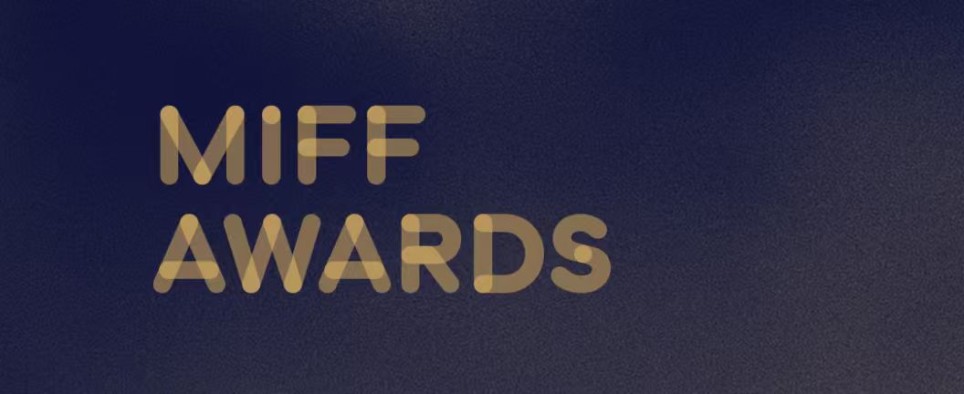
免责声明:以上内容源自网络,版权归原作者所有,如有侵犯您的原创版权请告知,我们将尽快删除相关内容。
上一篇:好莱坞对待过气女明星的一贯套路
下一篇:莫名其妙
『』相关阅读
 上班下班的一点点心得学习
上班下班的一点点心得学习
 父权与语言的之后是什么?
父权与语言的之后是什么?
 普遍性的吸血鬼
普遍性的吸血鬼
 从第一人称出发能看见种族吗?
从第一人称出发能看见种族吗?
 白发如雪,情根深种:新加坡版《塞外奇侠》的永恒武侠记忆
白发如雪,情根深种:新加坡版《塞外奇侠》的永恒武侠记忆
 有如此强的生命力本该做什么都能成功的
有如此强的生命力本该做什么都能成功的
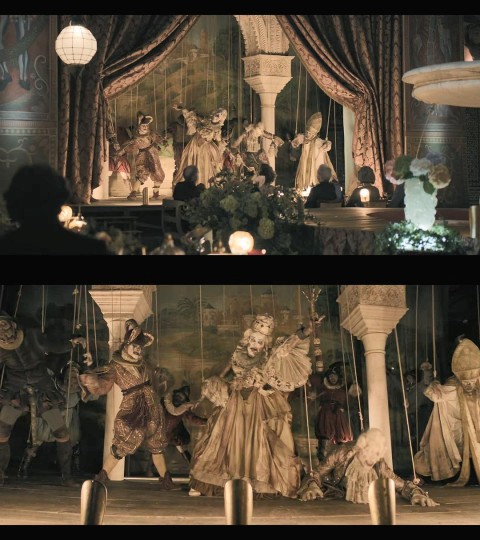 《行尸走肉:达里尔·迪克森》S3E7:远离家乡
《行尸走肉:达里尔·迪克森》S3E7:远离家乡
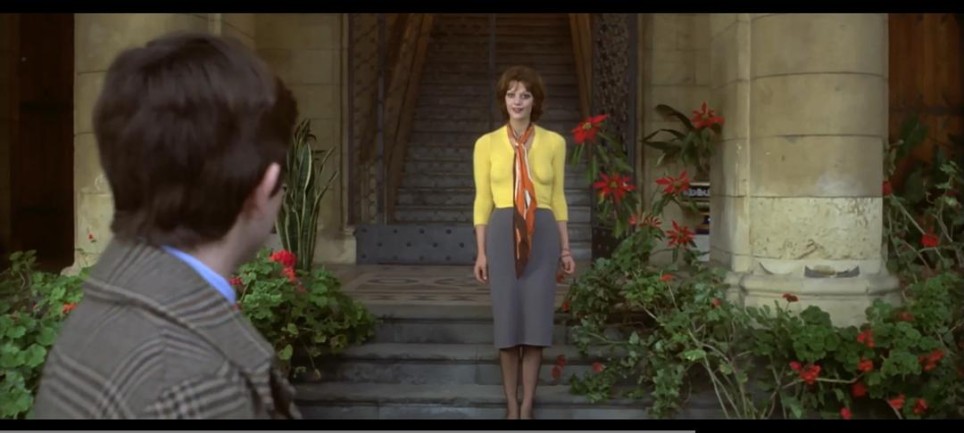 躁动与青春
躁动与青春
 霓虹下的生存与救赎
霓虹下的生存与救赎
 原来你也是爱情小丑
原来你也是爱情小丑
 《命悬一生》:原生家庭伤害的救赎,2个邻村女孩因为1点走向截然不同的人生
《命悬一生》:原生家庭伤害的救赎,2个邻村女孩因为1点走向截然不同的人生
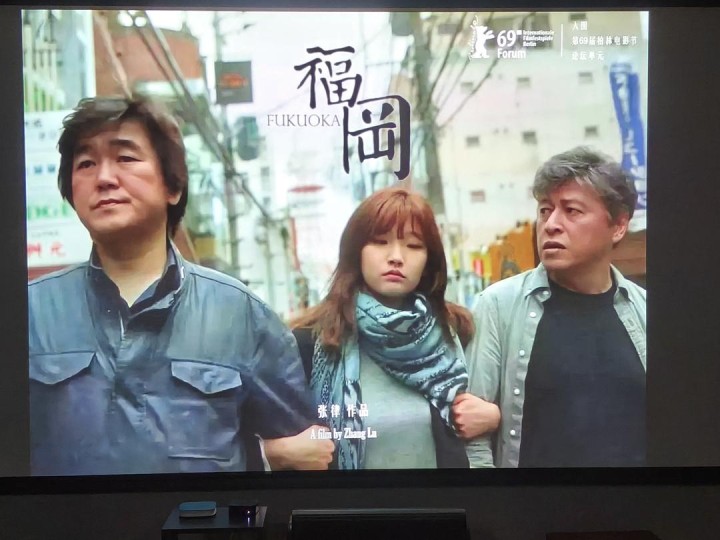 一部后劲很足的三人行电影——《福冈》
一部后劲很足的三人行电影——《福冈》
 不要被冬天困住
不要被冬天困住
 命悬一生让人绝望地哭,心如刀绞地哭,窒息地哭……
命悬一生让人绝望地哭,心如刀绞地哭,窒息地哭……
 女性是一种处境
女性是一种处境
 破的是心灵中的地狱
破的是心灵中的地狱
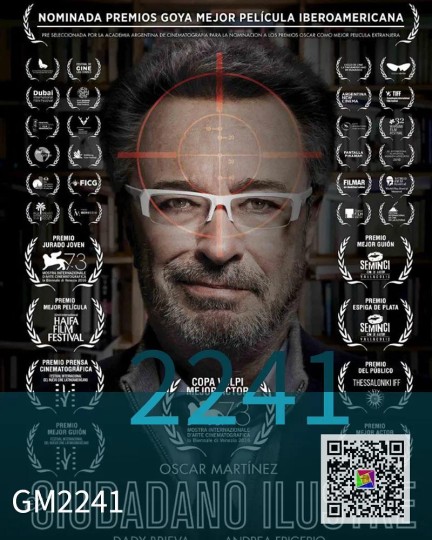 杰出公民|诺奖获得者的获奖感言都说些啥
杰出公民|诺奖获得者的获奖感言都说些啥
 李炳渊还算真诚和努力,但也只剩真诚和努力了
李炳渊还算真诚和努力,但也只剩真诚和努力了
 没有真实 谈何山河
没有真实 谈何山河
 电子影像与游戏体验的媒介互动
电子影像与游戏体验的媒介互动
